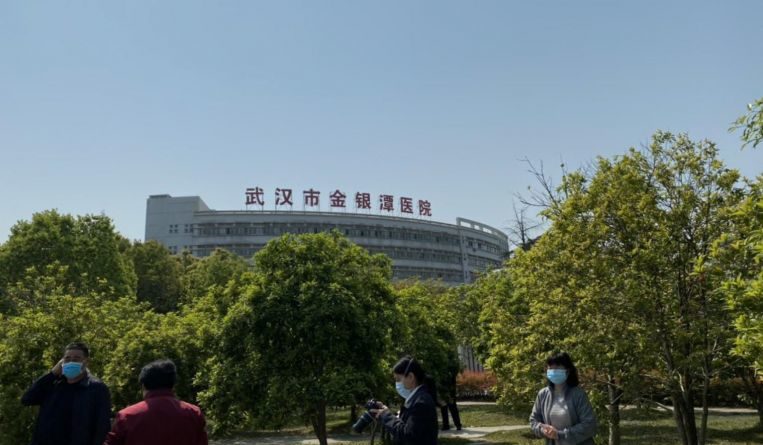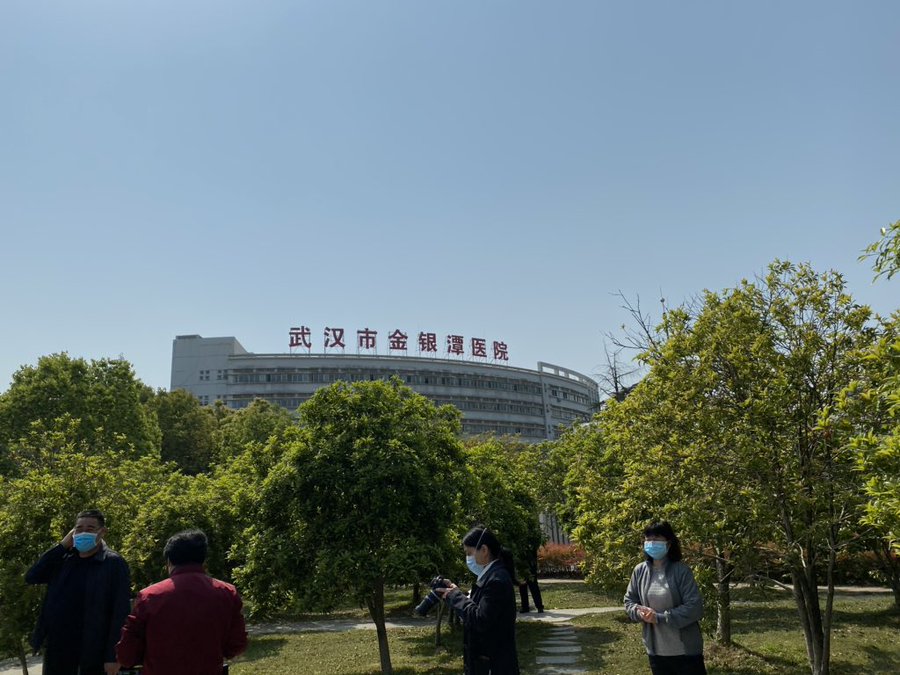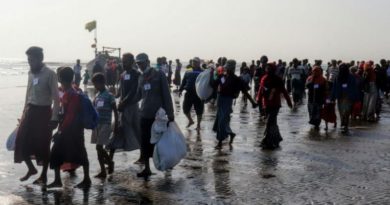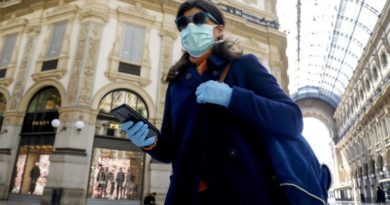COVID-19 THE “PLAGUE”: Day 137: WUHAN CITY-China Epicenter – Seizing a rare chance to visit Wuhan’s ‘ground zero’ coronavirus hospital
Jinyintan is the only specialist infectious diseases hospital in all of Hubei province.ST PHOTO: ELIZABETH LAW
China Correspondent Elizabeth Law is in Wuhan to report on the city coming out of a two-month-long lockdown as it battled the coronavirus outbreak.
WUHAN – “We’re taking you to hospital.”
The statement elicited a surprising amount of excitement in me.
Again, these are not normal times and that wasn’t just any hospital – it was Jinyintan, dubbed “Ground Zero” during the height of the coronavirus outbreak because it had the highest concentration of serious cases.
Jinyintan is the only specialist infectious diseases hospital in all of Hubei province, which meant that the most serious cases were treated there. It was also where patients were taken early in the outbreak, when the disease we now know as Covid-19 was “a mysterious pneumonia that surfaced in a Wuhan seafood market”.
This government-organised tour was a rare chance for access.
In January, when I visited, food delivery men were still zipping in and out of the hospital compound and only the south block had been sealed off. Family members were still allowed to drop off food for loved ones, and one I spoke to even spat out a wad on phlegm in the carpark.
How things have changed. There is now heavy security around the premises, and people without business in the compound cannot enter. Food deliveries must be left outside. Outdoor spitting has definitely been curtailed.
When the time came for the visit last Thursday (April 9), everyone seemed somewhat tense, including an exceptionally shouty government minder, which I put down to us visiting a hospital that still has over 100 coronavirus patients.
Some journalists even showed up in full body protective suits with surgical gloves and goggles, any gaps sealed with tape. (Disclaimer: I had all of those in my bag, but planned to put it on only when we entered the building or the “contamination zone”.)
When the bus pulled into the hospital, it was through a side entrance that led to an administrative building. Was there going to be a briefing in the office?
As we got off the bus, there was a small, stout man standing at the building steps, already briefing journalists whose bus arrived about five minutes earlier.
In work mode, everyone panicked and rushed towards the little circle, jostling for a good shot, social distancing be damned.
A little bit on the man: Dr Zhang Dingyu heads the Jinyintan Hospital and led its efforts throughout the entire outbreak. By the way, he also has ALS, better known as the disease that sparked off the ice bucket challenge.
After a little bit of yelling and nudging from our minders, it turned out we were meant to first have a briefing in the garden. Dr Zhang led the way, walking shockingly fast.
There, helpfully, was a foldable table covered in blue surgical cloth placed about a metre behind a cordon set up with a queue pole. Journalists dutifully stood behind.
Around us were about 10 members of staff watching and filming the spectacle.
For the next 45 minutes, under the increasingly hot and glaring midday sun, Dr Zhang talked about the hospital’s response, treatment methods, type of treatments and their biggest worry at the moment: long-staying patients.
Standing throughout, he fielded questions patiently, pausing once to remove his jacket.
And then it was over.
A struggle began: on one side Dr Zhang, who clearly had more to say, and journalists who never say no to an important and chatty interviewee; on the other, his minders who needed to get him somewhere and our minders, who needed to keep the programme on track.
As we followed him through the garden, someone behind yelled: “Block them, someone needs to block them.”
No one wanted to get into the socially un-distant mass until someone finally pulled the doctor off towards the wards.
“Okay, thank you, please get back on the bus.”
Wait, what? We didn’t even get close enough to catch a whiff of disinfectant.
Our next stop was the temporary hospital built in an exhibition centre for mild cases. Shut for a month now, its bed frames stand stripped bare. All the equipment has been moved out, its medical staff and patients long gone.
It offered a glimpse of what is happening in several countries around the world, including Singapore, where temporary facilities are being used to free up hospital beds.
But nonetheless, it was still somewhat disconcerting to be in a cavernous, now empty – and thoroughly disinfected – former hospital.
And that protective suit? It has yet to leave my backpack.
.
African community targeted in China virus crackdown
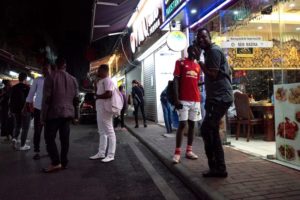
(FILES) This file photo taken on March 2, 2018 shows people gathering on a street in the “Little Africa” district in Guangzhou, the capital of southern China’s Guangdong province. Africans in southern China’s largest city say they have become targets of suspicion and subjected to forced evictions, arbitrary quarantines and mass coronavirus testing as the country steps up its fight against imported infections.
Fred DUFOUR / AFP
.
.

African community targeted in China virus crackdown

Ads by: Memento Maxima Digital Marketing
@ [email protected]
– SPACE RESERVE FOR YOUR ADVERTISEMENT
China says it has largely curbed its COVID-19 outbreak but a recent cluster of cases linked to the Nigerian community in Guangzhou sparked the alleged discrimination by locals and virus prevention officials.Local authorities in the industrial centre of 15 million said at least eight people diagnosed with the illness had spent time in the city’s Yuexiu district, known as “Little Africa”.Five were Nigerian nationals who faced widespread anger after reports surfaced that they had broken a mandatory quarantine and been to eight restaurants and other public places instead of staying home.As a result, nearly 2,000 people they came into contact with had to be tested for COVID-19 or undergo quarantine, state media said.Guangzhou had confirmed 114 imported coronavirus cases as of Thursday — 16 of which were Africans. The rest were returning Chinese nationals. It has led to Africans becoming targets of suspicion, distrust and racism in China.Several Africans told AFP they had been forcibly evicted from their homes and turned away by hotels. “I’ve been sleeping under the bridge for four days with no food to eat… I cannot buy food anywhere, no shops or restaurants will serve me,” said Tony Mathias, an exchange student from Uganda who was forced from his apartment on Monday.”We’re like beggars on the street,” the 24-year-old said.Mathias added that police had given him no information about testing or quarantine but instead told him “to go to another city”.Police in Guangzhou declined to comment when contacted by AFP.A Nigerian businessman said he was evicted from his apartment earlier this week.”Everywhere the police see us, they will come and pursue us and tell us to go home. But where can we go?” he said.

Ads by: Memento Maxima Digital Marketing
@ [email protected]
– SPACE RESERVE FOR YOUR ADVERTISEMENT
– Growing tensions –
Other Africans said the community had been subject to mass COVID-19 testing even though many had not left China recently, and placed under arbitrary quarantine at home or in hotels. China has banned foreign nationals from entering the country and many travellers are being sent into 14-day quarantines either in their own accommodation or at centralised facilities.
Thiam, an exchange student from Guinea, said police ordered him to stay home on Tuesday even after he tested negative for COVID-19 and told officers he had not left China in almost four years.He believes the measures are specifically and unfairly targeting Africans. “All the people I’ve seen tested are Africans. Chinese are walking around freely but if you’re black you can’t go out,” he said.Denny, a Nigerian trader evicted from his flat on Tuesday, said police moved him to a hotel for quarantine after he spent several days sleeping on the streets. “Even if we have a negative test result, police don’t let us stay (in our accommodation) and they don’t give a reason why,” he said.

Ads by: Memento Maxima Digital Marketing
@ [email protected]
– SPACE RESERVE FOR YOUR ADVERTISEMENT
– ‘Crazy fear’ –
The infections in Guangzhou have sparked a torrent of abuse online, with many Chinese internet users posting racist comments and calling for all Africans to be deported.Last week a controversial cartoon depicting foreigners as different types of trash to be sorted through went viral on social media. “There’s just this crazy fear that anybody who’s African might have been in contact with somebody who was sick,” said David, a Canadian living in Guangzhou who did not want to give his full name.China’s foreign ministry acknowledged this week that there had been some “misunderstandings” with the African community.”I want to emphasise that the Chinese government treats all foreigners in China equally,” said spokesman Zhao Lijian on Thursday, urging local officials to “improve their working mechanisms”.The complaints in Guangzhou contrast with a welcome reception to Chinese efforts in battling the coronavirus across the African continent, where Beijing this week donated medical supplies to 18 countries.”When China engages Africa it’s the central government that does that, but when it comes to immigration enforcement that happens at the local level,” said Eric Olander, managing editor of the China Africa Project.”That explains why there’s an inconsistency in the more upbeat messaging we hear about Chinese diplomacy on the continent and the increasingly difficult realities that African traders, students and other expatriates face in their day-to-day lives in China.”© Agence France-Presse

All photographs, news, editorials, opinions, information, data, others have been taken from the Internet ..aseanews.net | [email protected] | Fo r comments, Email to : Al Bulario

